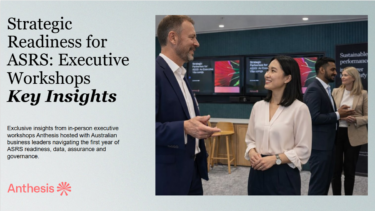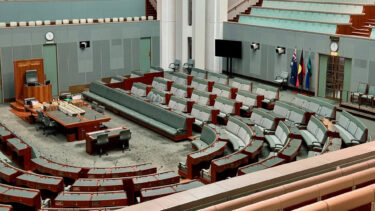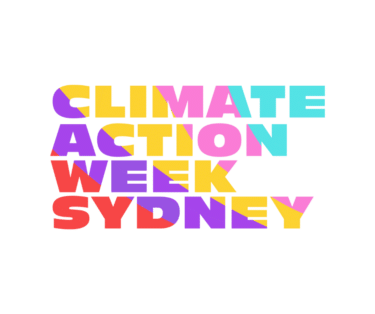
Table of Contents
- 6. Shifts in Human and Indigenous Rights
- 7. Investor Expectations/Finance Trends
- 8. Growing the Circular Economy
- 9. Litigation and Reputational Risk
- Key Takeaways for Business Leaders
Share this article
We recently hosted a webinar exploring the outcomes of the federal election and what they mean for corporate sustainability in Australia. Labor’s resounding win has cemented the country’s trajectory on climate and sustainability, and for senior leaders, now is not a time for hesitation or hoping things might change; it’s time to act. With the government’s renewed mandate and a likely increase in ambition through Australia’s 2035 target under the forthcoming Paris-aligned NDC, the direction is clear: decarbonisation, disclosure, and accountability are the way forward for any future-focused business.
Following on from our Part I insights, here are the Part II key takeaways from our experts on corporate sustainability in a post-election Australia.
6. Shifts in Human and Indigenous Rights
Australia is expected to move toward mandatory human rights due diligence (HRDD), aligned with growing global expectations. The Modern Slavery Act reforms and the appointment of an Anti-Slavery Commissioner signal that companies must go beyond box-ticking and dig deeper into their value chains. Indigenous rights reform is also on the horizon.
Key points:
- Mandatory human rights due diligence (HRDD) is expected, likely aligned with the Anti-Slavery Commissioner’s upcoming strategic plan.
- Reforms to the Modern Slavery Act indicate a shift from surface-level compliance to deeper action across value chains.
- New workplace gender equality laws require companies with over 500 employees to set and report on gender targets, intersecting with existing anti-discrimination and ESG policies.
- Indigenous rights remain a focus, with law reforms, treaty processes, and state-based initiatives underway, despite recent legislative setbacks.
- Legislative progress will depend on the federal government’s willingness to pursue reform during this term.
7. Investor Expectations and Finance Trends Are Accelerating
Australia’s sustainable finance landscape is evolving quickly. In the near term, Treasury is expected to release guidance on credible climate transition plans and consult on a sustainable finance taxonomy and product labelling regime. These developments will shape investor expectations and disclosure obligations. Sustainability-linked finance and ESG-assessed capital flows are set to increase, driven by growing government investment and policy signals. Instruments influencing this shift include:
- The Future Made in Australia initiative, with over $20 billion in funding and likely expansion, is set to steer capital into low-emissions and strategic industries
- Expanded Clean Energy Finance Corporation (CEFC) funding and evolving ESG criteria for public investment decisions
- A growing suite of government rebates, tax incentives and procurement standards that will embed ESG benchmarks into mainstream financial flows

8. Growing the Circular Economy
Last year, the federal government adopted a circular economy framework and that had the aim of doubling Australia’s national circularity rate, currently sitting at just 4.6%, well below the global average of 7.2%. Key initiatives include packaging design reform and increased scrutiny of industry co-regulation, signalling a likely shift toward stronger government intervention if progress stalls.
Key points:
- Targets have been set to reduce the material footprint of the economy by shifting away from virgin materials.
- The government is developing packaging design guidance to support these goals; further details are expected soon.
- In April, the Australian Packaging Covenant Organisation (APCO) released a consultation paper signalling a more active role in building downstream recycling systems. While the APC is nominally voluntary, state legislation enforces compliance for non-members, creating a form of co-regulation. The consultation paper reflects growing government frustration with industry-led approaches, suggesting that stricter regulation is likely if voluntary progress remains slow.
9. Litigation and Reputational Risk
Litigation and regulatory scrutiny around ESG is intensifying in Australia, with civil society and regulators applying pressure at both the investor and investee levels. Key legal cases and the rollout of contested policies like the Future Gas Strategy are likely to drive further legal risk, particularly concerning climate and human rights.
Key points:
- ESG litigation and complaints are expected to increase, driven by active regulators and civil society groups.
- The implementation of the Future Gas Strategy, which reaffirms gas as part of Australia’s transition, is likely to attract legal challenges from activists and strategic litigants.
- A key legal test in 2024 will be the Pabai v Commonwealth case, which seeks to establish a duty of care owed to Indigenous communities in the context of climate change. Judicial commentary on foreseeability and climate-related impacts in Pabai could have wider implications for climate risk accountability.
- International ESG frameworks and evolving case law are likely to shape domestic regulatory expectations in the years ahead.
Key Takeaways for Business Leaders
From both our Part I. insights and this article:
- Treat ASRS as locked in and prepare directors for accountability
- Use policy certainty to plan long-term decarbonisation
- Anticipate expansion to AASB S1 and nature-related disclosures
- Strengthen supply chain visibility for future human rights due diligence
- Keep your eye out for Australia’s new NDC to gauge ambition and actions that stem from this
- Watch for fuel tax credit reform, broader Safeguard review and potential Carbon Border Adjustment Mechanism (CBAM)
- Keep up to date on any shifts under the circular economy framework and the upcoming packaging design guidance
- Look out for a potential unified national registry covering carbon, renewable energy, and biodiversity credits to streamline environmental markets and reporting.
Need Help to Understand the Post-Election Landscape and How to Progress?
Anthesis are technical experts and trusted advisors to some of the world’s most well-known companies, with over a decade of experience. We’re here to guide you through the transition, solving sustainability challenges and helping you leverage opportunities from start to finish. Our solutions span the full sustainability spectrum, offering a cohesive and actionable path to transformation and resilience.
Call us for a chat on +61 3 7035 1740 or reach out to our experts via email or the form below.
We are the world’s leading purpose driven, digitally enabled, science-based activator. And always welcome inquiries and partnerships to drive positive change together.




